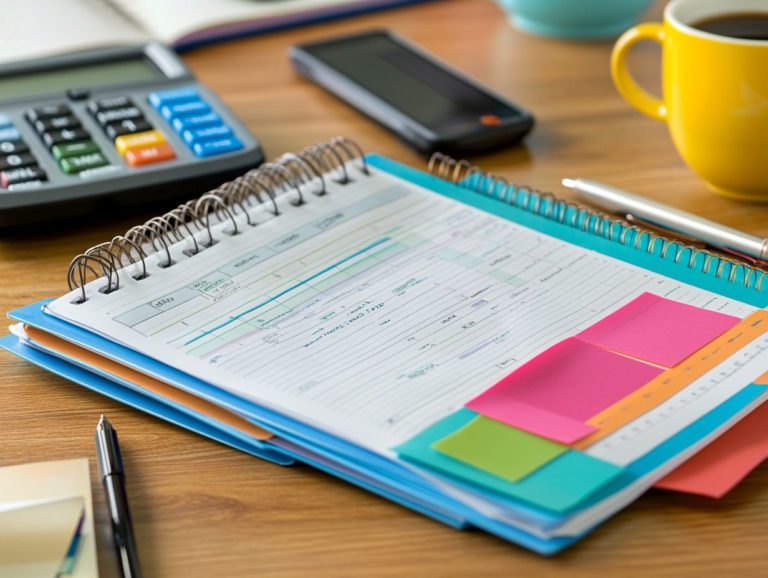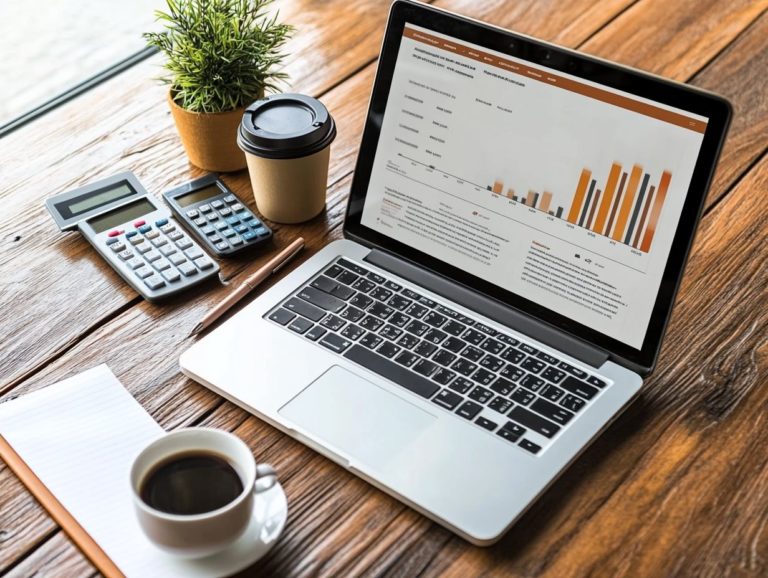How to Track Your Expenses?
Tracking your expenses is essential for achieving financial stability and success. By understanding where your money goes, you can identify spending patterns, create effective budgets, and make informed financial decisions that align with your goals.
This article explores the benefits of expense tracking, comparing manual and automated methods, along with tools that can simplify the process. You’ll find valuable tips for successful tracking, common pitfalls to avoid, and practical steps to create a budget that works for you.
Seize this chance to take control of your finances now!
Contents
- Key Takeaways:
- The Importance of Tracking Expenses
- Methods for Tracking Expenses
- Tools for Expense Tracking
- Creating a Budget
- Tips for Successful Expense Tracking
- Common Mistakes to Avoid
- Frequently Asked Questions About Tracking Expenses
- How to Track Your Expenses?
- What are the benefits of tracking my expenses?
- What are some effective methods for tracking expenses?
- How often should I track my expenses?
- What should I do if I have trouble sticking to my budget?
- Can I track my expenses without using a budget?
- Are there any tools or resources that can help me track my expenses?
Key Takeaways:

The Importance of Tracking Expenses
Tracking your expenses is vital for achieving financial health and control. It helps you become aware of your spending habits.
By categorizing your expenses differentiating between fixed costs like your mortgage and utilities, and optional spending on entertainment and groceries you can uncover those sneaky spending leaks that may jeopardize your financial freedom.
Effective expense tracking forms a solid foundation for creating a budget that aligns with your financial goals. This fosters a disciplined approach to money management and builds the habits necessary for long-term fiscal responsibility.
Benefits for Financial Management
Tracking your expenses offers many benefits for managing your finances. It increases your awareness of spending habits and improves decision-making regarding savings and debt management.
By analyzing your spending patterns, you gain insights into your financial behavior, which is essential for setting realistic goals and creating a solid monthly budget.
Keep in mind that tracking your spending encourages accountability and helps you identify unnecessary expenses you can cut, allowing for better resource allocation. Adopting budgeting techniques, like the 50/30/20 rule allocating 50% of your income to needs, 30% to wants, and 20% to savings can greatly enhance your financial health.
Taking time each week to review your expenses fosters a proactive mindset, empowering you to make informed decisions that align with your long-term goals. Using a budgeting system can further support this process, paving a clearer path to achieving your financial aspirations while reducing stress and improving your overall well-being.
Methods for Tracking Expenses
You have a variety of simple methods available to track your expenses and manage your finances effectively. Whether you choose to log your spending manually or use automated tracking systems, each method has unique advantages.
By using tools like spending logs or expense trackers, you can categorize your expenses and monitor your income, enabling informed budgeting decisions that support your financial goals. For more detailed strategies, check out this guide on how to track your freelance expenses efficiently. This is crucial for maintaining spending accountability.
Manual vs. Automated Tracking
Manual tracking involves carefully recording your expenses by hand or using spreadsheets. In contrast, automated tracking employs budget apps and software to streamline your expense management process. Each method has its unique advantages and challenges, influencing how effectively you can monitor your finances.
For instance, manual tracking provides a hands-on approach that keeps you connected with your spending habits. It cultivates a deeper understanding of your cash flow since each transaction is recorded in real time. However, this method can take a lot of time and is susceptible to human error. On the other hand, automated tracking simplifies the process with computer programs that automatically sort your expenses, saving you both time and effort. This approach can lead to more informed budgeting decisions through detailed analytics, though it may reduce your personal engagement with financial activities.
To unlock your financial potential, find a balance by combining both methods. This way, you can maximize the effectiveness of each approach, leading to a more comprehensive understanding of your financial landscape.
Tools for Expense Tracking
Utilizing the right tools for expense tracking can greatly elevate your financial planning process. You have a range of excellent options at your disposal, including budgeting apps like Quicken and EveryDollar, which can help streamline your budget maintenance.
These tools simplify the intricacies of expense tracking and budget adjustments, giving you the power to maintain a firm grip on your finances. This is vital for achieving financial freedom.
Budgeting Apps and Software

Budgeting apps like the U.S. Bank Mobile App, available on both Android and iPhone, are powerful financial tools that empower you to efficiently track expenses and manage your budget. With features that categorize your spending, monitor patterns, and help you achieve your financial goals, these apps become critical allies in your financial journey.
Beyond these foundational functions, apps like Mint and You Need a Budget (YNAB) boast intuitive interfaces designed to simplify managing your finances. You can effortlessly dive into your spending habits and receive tailored advice that resonates with your unique financial situation. Tools like PocketGuard offer a clear snapshot of your disposable income, helping you understand what you have left after accounting for bills, goals, and necessities.
Each budgeting application comes with distinct features, so it’s essential to evaluate your specific financial circumstances and preferences. This way, you can choose the app that aligns seamlessly with your lifestyle and objectives, making budgeting a breeze rather than a burden.
Spreadsheets and Paper Tracking
For those who appreciate a classic touch, spreadsheets and paper tracking methods offer an elegant solution for managing expenses. These tools enable you to categorize your expenses, visualize spending patterns, and maintain the simplicity of budgeting.
By organizing your expenses into clear categories like groceries, utilities, and entertainment, you can quickly pinpoint where your money flows each month. Setting up a straightforward spreadsheet or a dedicated notebook can be advantageous. To enhance your tracking method, consider mastering the art of expense tracking. Beginning with a month-by-month chart allows you to gain a clear overview of your finances.
Incorporating color coding or distinct sections can enhance your navigation through the data. If digital alternatives feel overwhelming, these tactile methods can provide a sense of comfort, making the tracking process not only effective but also engaging.
Regularly reviewing your records keeps you aligned with your financial goals, empowering you to make informed spending decisions that truly reflect your priorities.
Creating a Budget
Creating a budget is an essential step on your journey to financial success. You get to create a structured monthly money plan that harmonizes your income with your expenses.
By pinpointing relevant expense categories and aligning them with your financial goals, you can craft a budget that truly reflects your priorities and aspirations. This thoughtful approach allows you to gain control over your finances and work steadily toward your dreams.
Steps for Setting Up a Budget
Setting up a budget demands a clear plan and specific steps, beginning with an accurate list of expenses that mirrors your monthly expenditures. This foundational element is essential, as it guides necessary budget adjustments and aligns your spending with your financial aspirations.
To create this list, you should systematically track every purchase, from regular payments like rent and utilities to variable expenses that change, like money spent on eating out and entertainment. Once you’ve established this list, the next step is to record all your income sources, providing a comprehensive view of your available financial resources. For assistance, consider the best tools for tracking expenses.
With both income and expenses laid out, you ll find it easier to pinpoint areas for adjustments. Regularly reviewing these financial documents fosters accountability, ensuring your budgeting practices are effective and adaptable to any changes life throws your way.
Tips for Successful Expense Tracking
Successful expense tracking relies on a few key principles, especially emphasizing consistency and accountability in spending, particularly through effective expense management.
By establishing a routine for tracking transactions and diligently monitoring your expenses, you cultivate a heightened sense of financial responsibility and awareness that can profoundly enhance your financial habits.
Consistency and Accountability
Consistency in tracking your expenses is essential for cultivating strong financial habits. It encourages you to regularly review your spending patterns and monitor your income.
By holding yourself accountable, you can align your financial practices more closely with your long-term goals. Establishing a familiar routine makes it easier to pinpoint areas where you might tend to overspend.
For instance, using simple tools like spreadsheets or dedicated apps can simplify the process of logging your daily transactions. Setting aside specific times each week to analyze your financial records enables you to recognize spending trends and uncover opportunities for savings.
This kind of accountability not only builds your discipline but also encourages a proactive mindset toward achieving your financial goals, ultimately leading to a more secure and stress-free financial future.
Adjustments and Re-Evaluation

Regularly adjusting your budget and re-evaluating your financial goals are essential elements of effective expense management. By analyzing your spending patterns and pinpointing areas for improvement, you can tailor your budget to align more closely with your current financial situation.
This proactive strategy ensures that your financial plans remain relevant and effective over time. For instance, after a significant life change like losing a job or facing increased living expenses you must revisit your financial objectives.
Employing strategies like tracking your monthly expenses, setting aside a buffer for unexpected costs, and recalibrating your savings targets can be highly beneficial. By consistently assessing your financial landscape, you can maintain a clear vision toward your goals, ultimately bolstering your financial health and stability.
Common Mistakes to Avoid
Avoiding common budgeting mistakes is essential for maintaining your financial control and achieving success in expense tracking. Small oversights like ignoring spending leaks or neglecting to track cash expenditures can dramatically affect your overall financial health and your ability to stick to your budget.
Paying attention to these details gives you the power to create a more resilient financial strategy.
Overlooking Small Expenses
Overlooking small expenses is a common pitfall that can lead to considerable spending leaks over time, compromising your budget and financial awareness. It s crucial to recognize that even minor expenditures can accumulate and disrupt your financial plans.
Minor expenses can add up to hundreds or even thousands of dollars each year. This can create unexpected challenges in reaching your long-term financial goals. To combat this challenge, getting into the habit of tracking your spending closely is essential. Utilizing budgeting apps or maintaining a simple spreadsheet provides a clearer perspective on your spending patterns.
By categorizing your expenses and reviewing them monthly, you can pinpoint unnecessary outflows. Setting specific limits for these smaller purchases can also encourage greater financial discipline, allowing you to adhere to your budget and enhance your overall financial health.
Not Tracking Cash Spending
Failing to track cash spending is a common oversight that can significantly undermine your efforts in accurate expense tracking and financial control. Cash transactions often slip through the cracks, leaving you with an incomplete picture of your financial landscape.
This oversight can cause you to overspend, lead to unexpected expenses, and ultimately result in financial stress. To foster effective budgeting, consider keeping a dedicated notebook or utilizing a budgeting app specifically designed for recording cash expenditures. This practice helps you see your spending clearly and promotes mindful financial transactions.
Setting a weekly or monthly cash budget can establish limits that encourage discipline. By routinely reviewing these records alongside your other spending categories, you can make more informed financial decisions, paving the way toward achieving your long-term financial goals.
Frequently Asked Questions About Tracking Expenses
How to Track Your Expenses?
Tracking your expenses is an important aspect of managing your finances and staying on budget. Here are some frequently asked questions about how to track your expenses. Start tracking today to take control of your financial future!
What are the benefits of tracking my expenses?

Tracking your expenses allows you to see where your money is going and identify areas where you can cut back and save. It also helps you stay on top of your budget and avoid overspending.
What are some effective methods for tracking expenses?
There are various methods you can use to track your expenses, such as creating a spreadsheet, using a budgeting app, or simply keeping receipts and recording them in a notebook.
How often should I track my expenses?
It’s recommended to track your expenses at least once a week, but preferably on a daily basis. This will give you a more accurate picture of your spending habits and help you make necessary adjustments to your budget.
What should I do if I have trouble sticking to my budget?
If you find yourself overspending and having difficulty sticking to your budget, try identifying areas where you can cut back, setting smaller and more achievable financial goals, and tracking your expenses more frequently to stay on top of your spending.
Can I track my expenses without using a budget?
Yes, you can still track your expenses without having a strict budget in place. This can help you better understand your spending habits and make more informed financial decisions in the future.
Are there any tools or resources that can help me track my expenses?
Yes, there are many budgeting apps and online tools available that can help you track your expenses more easily and efficiently. Some popular options include Mint, YNAB, and Personal Capital.






